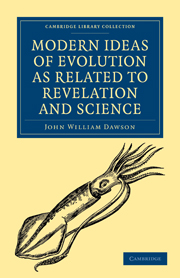Book contents
- Frontmatter
- PREFACE
- Contents
- CHAPTER I PRESENT ASPECTS OF THE QUESTION
- CHAPTER II WHAT IS EVOLUTION?
- CHAPTER III THE ORIGIN OF LIFE
- CHAPTER IV THE APPARITION OF SPECIES IN GEOLOGICAL TIME
- CHAPTER V MONISTIC EVOLUTION
- CHAPTER VI AGNOSTIC EVOLUTION
- CHAPTER VII THEISTIC EVOLUTION
- CHAPTER VIII GOD IN NATURE
- CHAPTER IX MAN IN NATURE
- CHAPTER X GENERAL CONCLUSIONS
- APPENDIX I WEISMANN ON HEREDITY
- APPENDIX II DR. McCOSH ON EVOLUTION
CHAPTER IX - MAN IN NATURE
Published online by Cambridge University Press: 29 August 2010
- Frontmatter
- PREFACE
- Contents
- CHAPTER I PRESENT ASPECTS OF THE QUESTION
- CHAPTER II WHAT IS EVOLUTION?
- CHAPTER III THE ORIGIN OF LIFE
- CHAPTER IV THE APPARITION OF SPECIES IN GEOLOGICAL TIME
- CHAPTER V MONISTIC EVOLUTION
- CHAPTER VI AGNOSTIC EVOLUTION
- CHAPTER VII THEISTIC EVOLUTION
- CHAPTER VIII GOD IN NATURE
- CHAPTER IX MAN IN NATURE
- CHAPTER X GENERAL CONCLUSIONS
- APPENDIX I WEISMANN ON HEREDITY
- APPENDIX II DR. McCOSH ON EVOLUTION
Summary
Few words are used among us more loosely than ‘nature.’ Sometimes it stands for the material universe as a whole. Sometimes it is personified as a sort of goddess, working her own sweet will with material things. Sometimes it expresses the forces which act on matter, and again it stands for material things themselves. It is spoken of as subject to law, but just as often natural law is referred to in terms which imply that nature itself is the lawgiver. It is supposed to be opposed to the equally vague term ‘supernatural’; but this term is used not merely to denote things above and beyond nature, if there are such, but certain opinions held respecting natural things. On the other hand, the natural is contrasted with the artificial, though this is always the outcome of natural powers and is certainly not supernatural. Again, it is applied to the inherent properties of beings for which we are unable to account, and which we are content to say constitute their nature. We cannot look into the works of any of the more speculative writers of the day without meeting with all these uses of the word, and have to be constantly on our guard, lest by a change of its meaning we shall be led to assent to some proposition altogether unfounded.
For illustrations of this convenient though dangerous ambiguity, I may turn at random to almost any page in Darwin's Origin of Species. In the beginning of Chapter III. he speaks of animals ‘in a state of nature,’ that is, not in a domesticated or artificial condition, so that here nature is opposed to the devices of man.
- Type
- Chapter
- Information
- Modern Ideas of Evolution as Related to Revelation and Science , pp. 202 - 225Publisher: Cambridge University PressPrint publication year: 2009First published in: 1890

